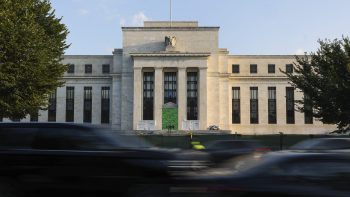President Obama is still popular among voters, but his handling of the economy is starting to wear thin with more of them. Voters are especially concerned about two things: the budget deficit and government over-involvement.
From the Wall Street Journal/NBC News poll:
58 percent of respondents said Obama and Congress should focus on keeping the budget deficit down, even if takes longer for the economy to recover. The Congressional Budget Office estimates the federal deficit could top $1.8 trillion this fiscal year — by far a record.
Nearly 70 percent said they had concerns about federal intervention in the economy, including Obama’s decision to take an ownership stake in General Motors and the prospect of more government involvement in healthcare.
If you a few minutes, here’s an interesting story on why Australia seems to have largely avoided the global financial crisis:
Where does the story start? Perhaps the best place is in the 1980s, when banks were deregulated, given the keys to the car, revved it up to an exhilarating pace — and ran off the road.
Meanwhile, the analysis continues over President Obama’s financial regulatory plan. Steven Pearlstein writes in the Washington Post that simply shuffling things around isn’t going to cut it:
What does it tell you when banks, investment houses, insurance companies and derivatives traders are so pleased with their regulators that they are prepared to pull out all the stops to keep them?
What it tells me is that the current system of financial regulation has been thoroughly captured by the companies it was meant to restrain — and that the only way to put things right is to bring in new rules, a new structure and tough new regulators. Anything short of that, and you can almost guarantee that the inmates will be back in charge of the asylum by the time the next bubble starts to develop.
On NPR, economist Peter Morici says there are no guarantees with any regulatory plan:
The unfortunate truth is that financial crises often occur because regulators fail to see the greatest threats until after the fact. In this most recent financial crisis, regulators knew lots of subprime mortgages were being written, and that banks were parking mortgage-backed securities in structured investment vehicles. But no one realized how much of a risk those practices posed to home values and the solvency of banks until lots of homeowners defaulted.
The only way to be sure of avoiding financial crises is by bestowing perfect foresight on government regulators. That’s the stuff of fairy tales. Obama’s new financial regulations reforms can’t make him omnipotent, and Obama can’t protect us from what he can’t predict.
But perhaps the most important analysis comes from FDIC Chairwoman Sheila Bair. She was on CNBC this morning, and this is what she said:
“[Obama’s regulation is] a good opening to the process,” said Bair. “I commend the President for getting personally involved in this and taking leadership and putting his own considerable influence behind the efforts…We’re still analyzing the whitepaper and want to work with the administration and Congress constructively on this.”
Still analyzing it? Bair is clearly not ready to full-on endorse the plan. Based on her comments, she seems fairly reluctant to give the Fed so much power, and of course, she’s worried about the FDIC’s role.
You can watch the entire interview here:
There’s a lot happening in the world. Through it all, Marketplace is here for you.
You rely on Marketplace to break down the world’s events and tell you how it affects you in a fact-based, approachable way. We rely on your financial support to keep making that possible.
Your donation today powers the independent journalism that you rely on. For just $5/month, you can help sustain Marketplace so we can keep reporting on the things that matter to you.


















